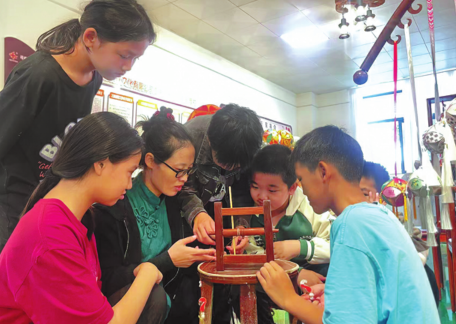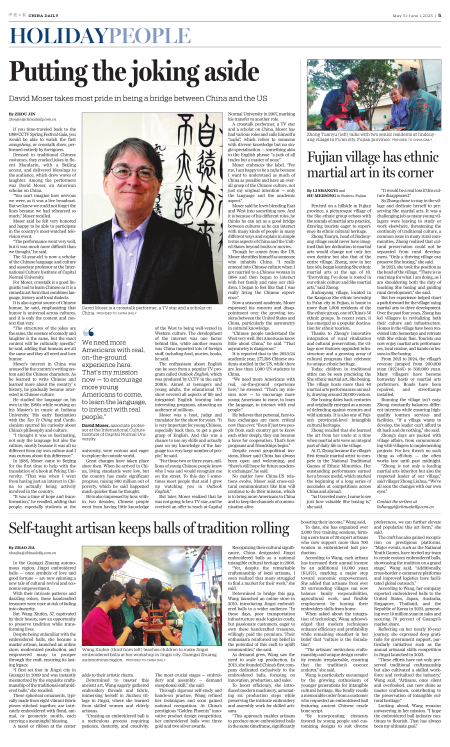
Wang Xiufen (third from left) teaches children to make Jingxi embroidered balls at her workshop in Jingxi city, Guangxi Zhuang autonomous region.
In the Guangxi Zhuang autonomous region, Jingxi embroidered balls — once symbols of love and good fortune — are now spinning a new tale of cultural revival and economic empowerment.
With their intricate patterns and dazzling colors, these handcrafted treasures were once at risk of fading into obscurity.
But Wang Xiufen, 37, captivated by their beauty, saw an opportunity to preserve tradition while transforming lives.
Despite being unfamiliar with the embroidered balls, she became a master artisan, launched an online store, modernized production, and empowered many to prosper through the craft, ensuring its lasting legacy.
"I first set foot in Jingxi city in Guangxi in 2009 and was instantly mesmerized by the exquisite craftsmanship of the traditional embroidered balls," she recalled.
These spherical ornaments, typically made from eight vibrant fabric pieces stitched together, are intricately embroidered with floral, animal, or geometric motifs, each carrying a meaningful blessing.
A tassel or ribbon at the center adds to their artistic charm.
Determined to master this ancient art, Wang eagerly gathered embroidery threads and fabric, immersing herself in Jiuzhou village in Jingxi, where she learned from skilled women and elderly artisans.
"Creating an embroidered ball is a meticulous process requiring patience, dexterity, and creativity. The most crucial stages — embroidery and assembly — demand exceptional skill," she said.
Through rigorous self-study and hands-on practice, Wang refined her techniques and soon gained national recognition. At China's prestigious "Golden Phoenix" innovative product design competition, her embroidered balls won three gold and two silver awards.
Recognizing their cultural significance, China designated Jingxi embroidered balls as a national intangible cultural heritage in 2008.
"Yet, despite the remarkable craftsmanship of local artisans, I soon realized that many struggled to find a market for their work," she said.
Determined to bridge this gap, Wang launched an online store in 2010, introducing Jingxi embroidered balls to a wider audience. "In those days, poor transportation infrastructure made logistics costly, but passionate customers, eager to own these handcrafted treasures, willingly paid the premium. Their enthusiasm reinforced my belief in the potential of this craft to uplift communities," she said.
As demand grew, Wang saw the need to scale up production. In 2013, she founded China's first company dedicated exclusively to the embroidered balls, focusing on innovation, production, and sales.
To boost efficiency, she introduced modern machinery, automating six production steps while preserving the intricate embroidery and assembly work for skilled artisans.
"This approach enables artisans to produce more embroidered balls in the same timeframe, significantly boosting their income," Wang said.
To date, she has organized over 2,000 free training sessions, forming a core team of 20 expert artisans who now support more than 700 women in embroidered ball production.
According to Wang, each artisan has increased their annual income by an additional 10,000 yuan ($1,375), marking a major step toward economic empowerment. She added that artisans from over 20 surrounding villages can now balance family responsibilities, agricultural work, and flexible employment by honing their embroidery skills from home.
When asked about the integration of technology, Wang acknowledged that modern techniques enhance efficiency and profitability while remaining steadfast in her belief that "culture is the foundation".
"The artisans' meticulous craftsmanship and unique design creativity remain irreplaceable, ensuring that the tradition's essence endures," she said.
Wang is particularly encouraged by the growing enthusiasm of younger generations for intangible cultural heritage. She fondly recalls a memorable order from a customer who requested an embroidered ball featuring ancient Chinese oracle bone script.
"By incorporating elements favored by young people and customizing designs to suit diverse preferences, we can further elevate and popularize this art form," she said.
The craft has also gained recognition on prestigious platforms. "Major events, such as the National Youth Games, have invited my team to create custom embroidered balls, showcasing the tradition on a grand stage," Wang said. "Additionally, cross-border e-commerce platforms and improved logistics have facilitated global outreach."
According to Wang, her company exported embroidered balls to the United States, Japan, Australia, Singapore, Thailand, and the Republic of Korea in 2023, generating over 10 million yuan in sales and securing 70 percent of Guangxi's market share.
Reflecting on her nearly 16-year journey, she expressed deep gratitude for government support, particularly initiatives such as the annual artisanal skills competition in Jingxi launched in 2022.
"These efforts have not only preserved traditional craftsmanship but also cultivated a skilled workforce and revitalized the industry," Wang said. "Artisans, once silent and overlooked, can now shine as master craftsmen, contributing to the preservation of intangible cultural heritage."
Looking ahead, Wang remains unwavering in her mission. "I hope the embroidered ball industry continues to flourish. That has always been my ultimate goal."
zhaojia@chinadaily.com.cn

